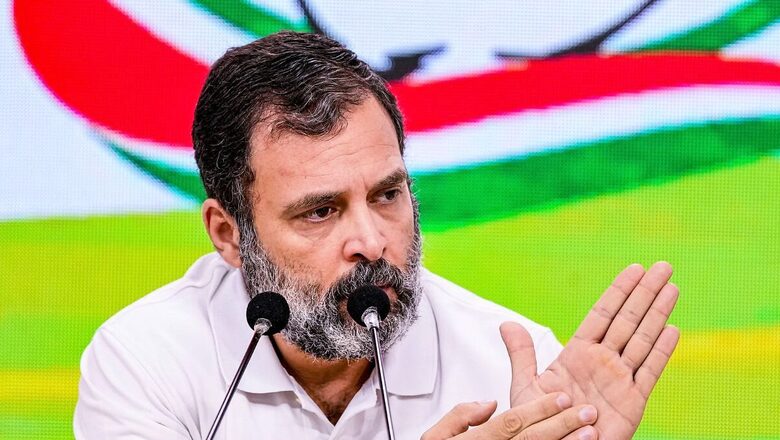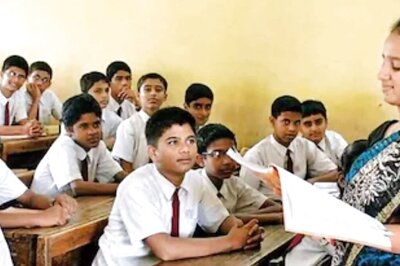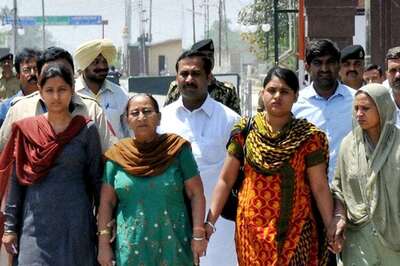
views
There are two possible outcomes resulting from Rahul Gandhi’s disqualification as a Lok Sabha MP. The first is that a higher court will stay the Surat Chief Judicial Magistrate Court’s order convicting Rahul. That will lead to a legal process. If successful, Rahul can return to Parliament as the elected representative of Wayanad constituency in Kerala. That is provided the by-election to Wayanad has not already been held.
The second outcome is more grim. The higher judiciary rejects Rahul’s appeal. Rahul will remain barred from Parliament. Worse, he will be barred from contesting elections for eight years under the Representation of the People Act (RPA) — two years in jail and six years of disqualification.
Ironically, Rahul’s grandmother Indira Gandhi’s election to Parliament was declared “null and void” by the Allahabad High Court in 1975 for a minor technical malpractice during the 1971 Lok Sabha election against Raj Narain. She was barred from standing for election for six years.
Mrs Gandhi was then prime minister. She toyed with the idea of resigning but was dissuaded by ministers in her “kitchen cabinet”. Instead, she imposed a draconian Emergency for the next 21 months, jailing over one lakh Opposition leaders (including Atal Bihari Vajpayee, LK Advani and Arun Jaitley), journalists (including Kuldip Nayar) and activists. She suspended the Constitution, subverted the Supreme Court and disallowed all habeas corpus petitions. A five-judge Supreme Court bench was formed to hear appeals to overturn Mrs Gandhi’s diktat on habeas corpus petitions.
The bench included the Chief Justice of India AN Ray and Justices HR Khanna, MH Beg, YV Chandrachud and PN Bhagwati.
Only Justice Khanna dissented with the five-bench majority verdict endorsing Mrs Gandhi’s diktat to disallow all habeas corpus petitions. According to one news report, “Despite being the seniormost Supreme Court judge, Justice Khanna was superseded by Justice Beg as Chief Justice in 1977. Justice Khanna resigned the same day.”
It was a moment of shame that the Supreme Court has yet to live down.
There obviously are key differences between the Indira Gandhi and Rahul Gandhi cases. Rahul is not prime minister. The Congress is not in power. Mrs Gandhi was disqualified as an MP by the Allahabad High Court for an electoral malpractice. Rahul was disqualified as an MP following the Chief Judicial Magistrate’s court order convicting him for two years in a criminal defamation case.
The BJP says Rahul insulted an entire OBC community, not three individuals which formed the core of the defamation case by a BJP MLA Purnesh Modi. This is what Rahul had said in Kolar, Karnataka while addressing a campaign rally in April 2019 ahead of the Lok Sabha election: “How come all the thieves have Modi as the common surname?”
If, for example, an MP or MLA asks, “How come all terrorists have common Muslim surnames”, that too could lead to a criminal defamation case on similar grounds. If convicted with a sentence of two years or more, the offending lawmaker too would face immediate disqualification.
In September 2013, the Manmohan Singh-led UPA2 government had prepared an ordinance to overturn a Supreme Court order of July 2013 in the Lily Thomas vs. Union of India case. The apex court had struck down a 90-day grace period granted to lawmakers under the Representation of People Act, 1951 if they were convicted with a sentence of two years or more. The apex court order gave lawmakers sufficient time to secure a stay on the conviction.
Prime Minister Manmohan Singh was on an official visit abroad when Rahul Gandhi, accompanied by Ajay Maken, stormed into a Delhi Press Club meeting and said the ordinance was “nonsense”.
This is what he said about the ordinance his own government had prepared to give lawmakers relief from immediate disqualification: “I tell you what my opinion on the ordinance is: That it is complete nonsense. It should be torn up and thrown away.”
Within days of his return from the United States, the Manmohan Singh-led government quietly withdrew the ordinance that 10 years later could have saved Rahul from immediate disqualification.
All, however, is not lost for the Congress or Rahul. The BJP will campaign on the issue of Rahul insulting OBCs. While exploring legal remedies, Rahul can play the role of martyr. Indians sympathise with those they believe have been wronged.
The other opportunity for the Congress is to now glue together a united Opposition front based on Rahul’s ‘victimisation’ by a BJP-influenced ecosystem. Mamata Banerjee, Arvind Kejriwal and Akhilesh Yadav — till now part of the anti-Congress third front — could make common cause.
Rahul is disqualified from Parliament — not from campaigning. In politics the most effective rallying point when you are in trouble is to appeal to voters’ emotions. Rahul may turn out to be a better election campaigner than parliamentarian.
If Rahul’s disqualification from Parliament rallies the rest of the Opposition behind the Congress and enhances Rahul’s appeal as a victim of an unfair system, the electoral needle could swing.
Rahul in Parliament, making gaffe after gaffe, was a better electoral asset for the BJP than a “wronged” Rahul seen by some as punished disproportionately for an abusive comment that deserved a reprimand but not two years in jail.
That could be the elixir of electoral rejuvenation Rahul was waiting for. It makes 2024 more challenging for all.
The writer is an editor, author and publisher. Views expressed are personal.
Read all the Latest Opinions here




















Comments
0 comment